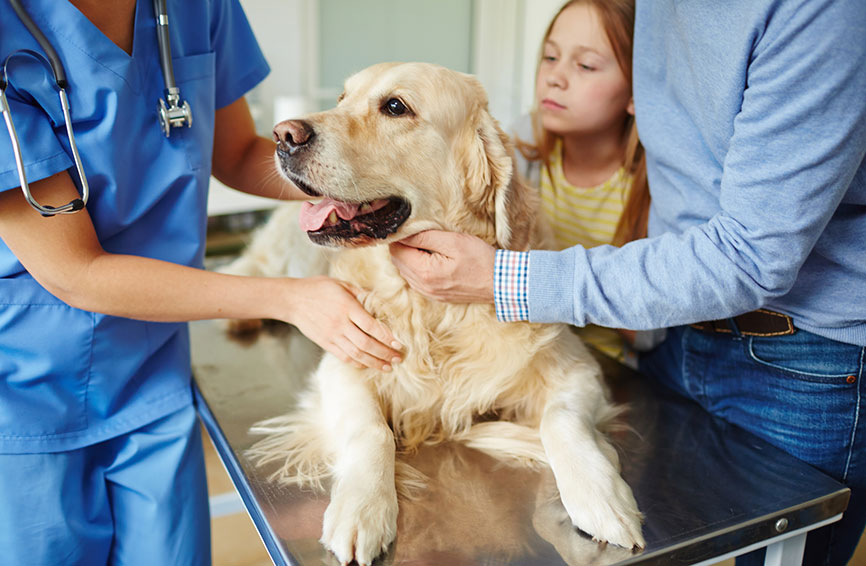Table of Contents
Medically reviewed by Dr. Zac Pilossoph, DVM
Introduction
Anyone with a pet knows that vet bills can get expensive quickly and that the costs seem to go up every year. Healthy Paws Pet Insurance has found the reasons for costly pet health care vary from advances in medical treatments to pets living longer to your willingness to spend money and give your pets the treatment they need, just like any other family member. It’s not just medical care we are spending money on. The American Pet Products Association (APPA) estimates pet parents spent $147 billion in overall pet care in 2023, a 7.4 increase over 2022.
Healthy Paws pet parents spent more than $523 million (18 percent increase from 2022) on accident or illness veterinary care, based on Healthy Paws claims data from Jan. 1 – Dec. 31, 2023. According to the APPA, U.S. pet parents spent nearly 6.7 percent more on vet care in 2023 than the previous year. Those unexpected visits to veterinary emergency rooms can really hit people in the pocketbook when an emergency vet visit can range anywhere from $200 to $10,000. Thirty-seven percent of Americans don’t even have $400 in emergency funds.
This is where pet insurance can help. Pet insurance can allow you to go into vet visits with confidence, knowing that you can do what is best for your pet and you have insurance to help you. The Healthy Paws plan insures new accidents and illnesses, including specialty and emergency care. With no caps on claims payouts and extensive coverage, pet parents can seek the care their pet needs with insurance helping protect against potentially high costs. For this annual report, we dove into Healthy Paws’ claims records to find out what the most common pet health conditions were and how much treatment costs so that pet parents would be aware when adopting a dog or cat.
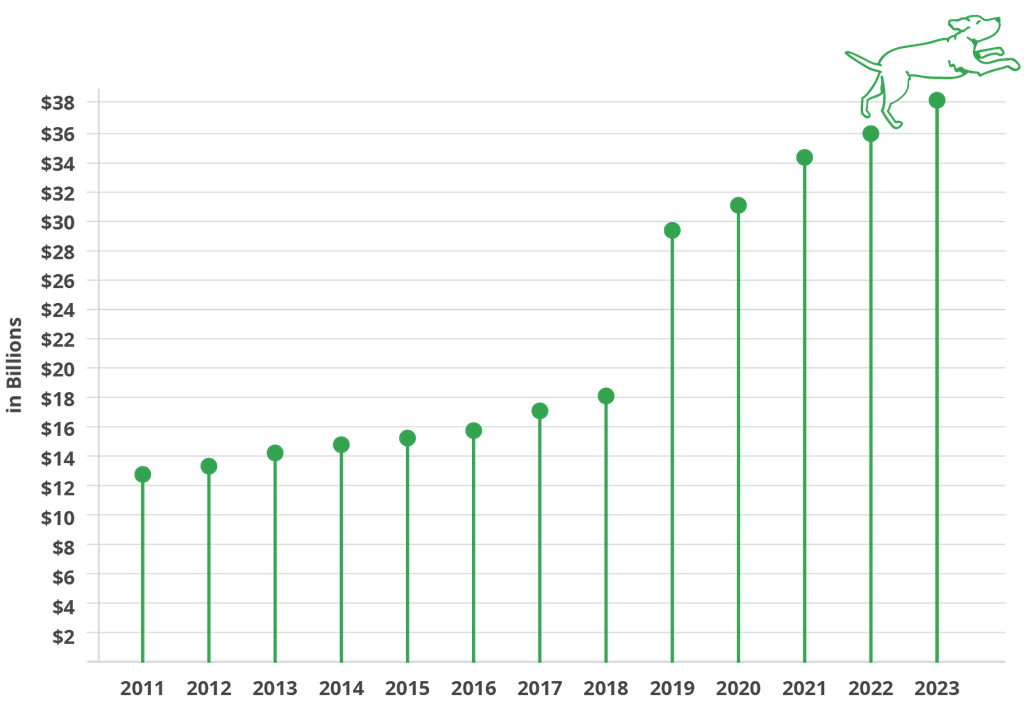
The cost of veterinary care is increasing
- As medical care is constantly progressing, so is veterinary care
- Procedures once only found in human medicine are now available for dogs and cats:
- Knee replacements
- Advanced allergy testing
- Cancer surgeries
- Bone marrow transplants
- Chiropractic care
- Technological innovations are increasing our pets’ quality of life
- This comes with a corresponding price tag at the vet
- A high inflation rate in general over the past few years has also impacted veterinarian services.
- In recent years, private equity takeovers of veterinary businesses have led to higher prices and less competition as the industry consolidates
Top 10 conditions in dogs*
1. Skin conditions
Average cost estimate: **: $200-$2,500
32% of top ten claims for dogs
Like people, dogs can suffer from various skin conditions, depending on environmental circumstances and genetics. Vets regularly see allergic skin disease, bacterial and fungal infections, insect bites, hot spots, rashes, mange, and more.
Symptoms may include:
- Scratching, itchy behavior including licking
- Dry, flaky skin or dandruff
- Cuts, wounds, abscesses, and sores
- Over-grooming
- Dull or dry coat as well as patchy spots, hair loss
- Folliculitis, acne, and bumps
- Redness
Common treatments/diagnostics the Healthy Paws plan insures for skin issues include:
- Diagnostic tools:
- Hair and skin cultures
- Impression smears
- Punch biopsies
- Allergy testing
- Parasitic treatments (fleas, mites, ringworm, parasites)
- Medicated shampoos and creams
- Antifungal treatments (yeast infection)
- Allergy shots
- Skin cancer treatment including surgery
2. Gastritis – stomach issues
Average cost estimate: $1,600-$5,000
19% of top ten claims for dogs
Gastrointestinal (stomach) issues can be caused by an extensive list of primary conditions, including gut inflammation, ingesting an indigestible or toxic substance, parasites, infections, some types of cancer, and other serious illnesses. Keep an eye on what your dog eats; life-threatening emergencies happen when dogs ingest bones, toys, and certain human foods that are toxic to dogs.
Symptoms may include:
- Vomiting
- Diarrhea
- Anorexia (not eating or drinking)
- Excessive drooling
- Foaming at the mouth
- Lethargy
- Yelping when touched
Common treatments/diagnostics the Healthy Paws plan insures for stomach issues include:
- Diagnostic tools:
- Lab tests
- X-rays
- Ultrasounds
- Endoscopy
- Antibiotics
- Probiotics
- Parasitic treatments
- Abdominal surgery

Lancer, a young Golden Retriever, suffered several medical emergencies in one year, including one incident where he swallowed some metal cable and another where he developed gastritis. He recovered from both and his pet parent was reimbursed $2,673.
3. Ear infections (otitis external)
Average cost estimate: $850
11% of top ten claims for dogs
Outer ear infections can be painful and annoying, but if they persist to the middle or inner ear, they can lead to neurological damage and deafness. Recurrent bacterial or fungal ear infections often have an underlying cause, such as allergies or abnormal ear anatomy, or ear canal tumors.
Symptoms may include:
- Head shaking or a head tilt
- Scratching at the ear
- Odor in the ear
- Redness or scabbing inside the ear
- Ear is hot to the touch
- Ear is painful/sensitive
- Excess wax, buildup, or crusting in the ear
Common treatments/diagnostics the Healthy Paws plan insures for ear infections include:
- Diagnostics tools:
- Ear culture and sensitivity test
- CT scans
- Advanced orthoscopy
- Ear cleaning to flush out debris
- Antibiotics
- Anti-inflammatories
- Antifungal treatments
- Pain medication
- Surgery (required for some conditions and end-stage chronic ear inflammation)
4. Eye conditions
Average cost estimate: $1,100
7.8% of top ten claims for dogs
Despite there being numerous causes for eye conditions, many if not most of them will initially look the same from the outside. Common eye conditions include corneal abrasions, ulcers, and infections, glaucoma, cataracts, dry eye and cherry eye. Almost all of these can lead to pain and even vision loss if not addressed. A vet should check out all eye conditions immediately to reduce the chance of long-term damage.
Symptoms may include:
- Blindness
- Redness
- Discharge or watery eyes
- Crustiness
- Squinting
- Pawing at the eye or face
- Dry eye (excessive blinking and eyes or eyelids seem swollen)
- Decreased appetite due to eye and facial pain
Common treatments/diagnostics the Healthy Paws plan insures for eye conditions include:
- Diagnostic tools:
- Schirmer tear test
- Intraocular pressure test
- Fluorescein stain
- Ophthalmoscopy (evaluation of the inner eye)
- Antibiotics and eye drops
- Parotid Duct Transposition (PDT) surgery (for dry eye)
- Cherry eye surgery
- Cataract and other eye surgeries
- Drops and surgery for glaucoma
- Enucleation (eye removal)

Riley, a 9-year-old shih tzu/Chihuahua mix, developed spots in his eyes that were diagnosed as cataracts. They grew quickly in both eyes and Riley was almost blind. He had successful surgery on both eyes and he can see again. His pet parent was reimbursed $6,161.
5. Heart conditions
Average cost estimate: $1,500-$2,500
6% of top ten claims for dogs
Heart disease in dogs is almost as common as in humans. In fact, approximately 10 percent of all dogs in the U.S. have heart disease. Heart issues in dogs can include heartworm disease, dilation of the heart, a thickening of the heart muscle, valve disease, and congestive heart failure (CHF), which is end-stage heart disease. The most common form of heart disease is chronic degenerative valvular disease, which makes up 75% of heart disease in dogs, and primarily affects small breed dogs over the age of five, according to VCA Hospitals.
Symptoms may include:
- Fatigue
- Reduced interest in exercise or exercise intolerance
- Difficulty breathing
- Loss of appetite
- Weight loss
- Distended abdomen
- Trouble sleeping
- Coughing
- Fainting or passing out
Common treatments/diagnostics the Healthy Paws plan insures for heart conditions include:
- Diagnostic tools:
- Blood pressure monitoring
- Echocardiogram
- Blood test
- Electrocardiograph (ECG)
- X-rays
- Heartworm test
- Heartworm treatment (if positive)
- Prescriptions: Diuretics, drugs to relax blood vessels, drugs to help the heart muscle function more effectively.

- Golden retriever Stevie Nicks suddenly collapsed while chasing a ball. He was diagnosed with an enlarged heart, a serious condition that can lead to heart failure if not treated. Stevie is doing well today on medication and a new diet. Her pet parents were reimbursed $3,327.
6. Growths and tumors
Average cost estimate: $300-$1,600
5.5% of top ten claims for dogs
This can be any abnormal lump, bump, or mass on your dog’s skin or elsewhere in their body. It could be an infection, cyst or benign tumor, or in the worst case, malignant cancer that requires removal and other treatment.
Symptoms may include:
- Any protrusion, lump, bump, or foreign growth qualifies
- Swelling
- Sores that won’t heal
- Strange odors
Common treatments/diagnostics the Healthy Paws plan insures for growths and tumors include:
- Diagnostic tools:
- Fine needle aspirates
- Biopsy
- Cyst drainage
- Traditional or laser surgery
- Chemotherapy and radiation (when cancerous)
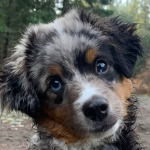
Jasper, a 2-year-old toy Australian Shepherd, developed tumors in his mouth that made it difficult to eat. He was treated with surgery to remove the lower part of his jaw and a course of radiation. He fully recovered and his pet parent was reimbursed $19,953
7. Seizures
Average cost estimate: $200-$5,000
5.3% of top ten claims for dogs
Seizures are caused by an abnormally excessive amount of electrical activity in the front part of the brain. Seizure activity can present in various ways, from facial twitching to uncontrollable full-body convulsions, and can last from several seconds to minutes. Causes for seizures can include conditions inside the brain (idiopathic epilepsy, stroke, infection, inflammation, brain cancer) or outside the brain (liver or kidney disease, low blood sugar levels, or ingesting poison).
Symptoms may include:
- Collapsing or falling to one side
- Uncontrollable convulsions: tonic-clonic contractions and tremors that include both the face and limbs
- Loss of consciousness or vision
- Excessive drooling or “foaming” at the mouth
- Loss of bowels or urine
- Signs of panic, bewilderment, or confusion; dazed or ‘far away’ look
- Teeth chomping; chewing
Common treatments/diagnostics the Healthy Paws plan insures for seizures include:
- Diagnostic tools:
- Bloodwork
- Blood pressure check
- Urine testing
- Thyroid testing
- MRI
- Spinal tap
- Anticonvulsant medication (in the case of epilepsy)
- Antibiotics (for infections)
- Chemotherapy, radiation or surgery (if the cause is cancer)

Ivy, a seven-year-old Australian Shepherd, suddenly suffered a full-blown seizure with convulsions and a loss of coordination. She was diagnosed with epilepsy and with medication and small diet changes, she now has them much less frequently, and they are mild. Her pet parents were reimbursed $4,422 for the diagnostics and initial treatments.
8. Infections
Average cost estimate: $800-$2,000
4.6% of top ten claims for dogs
Besides ear and skin infections and UTIs, dogs can develop a variety of other infections. Infections can be transmitted by exposure to another animal with the condition, drinking or eating contaminated water, food, or soil, from an insect bite, open wound, or an infected mother to her puppies.
- Fungal infections (histoplasmosis, cryptococcosis, coccidioidomycosis) live in the soil and can infect dogs when they eat or sniff contaminated soil. Dogs can also be infected through the skin, especially through a skin wound. Fungal infections do not respond to antibiotics.
- Parasitic infections are common and include hookworms, roundworms, tapeworms, Giardia, Coccidia, whipworms, Babesia and flukes.
- Bacterial infections can affect the respiratory system, skin, and kidneys. They include Leptospirosis, kennel cough, Anaplasma, Ehrlichia and Lyme disease.
Symptoms will vary depending on the infection, and may include:
- Scratching or licking the skin
- Stomach upset, vomiting, diarrhea, lack of appetite, weight loss
- Coughing or difficulty breathing
- Fever, aches, pain, lethargy and depression.
- A distended or pot belly
- Nasal discharge or nosebleed
- Intermittent lameness
Common treatments/diagnostics the Healthy Paws plan insures for infections include:
- Diagnostic tools:
- Lab tests (Urinalysis)
- Bloodwork
- Stool analysis
- X-rays
- Biopsy
- Antibiotics
- Intravenous fluids
- Antiparasitic medications
- Antifungal medications – ingested or topical
9. Urinary Tract Infections (UTIs)
Average cost estimate: $450
4.6% of top ten claims for dogs
Urinary tract infections (UTIs) are common in dogs and can develop at any time throughout their lives. UTIs are caused by bacteria that usually enter the urethra and travel up to the urinary bladder, where they multiply and colonize. Common symptoms include frequent urination, straining, discomfort, and discolored urine. They occur less frequently in male dogs due to their longer, narrower urinary tracts.
Symptoms may include:
- Frequent urination
- Blood in urine
- “Dribbling” urine
- Straining to urinate
- Whining or whimpering
- Break in housetraining
- Obsessive licking of the genital area
Common treatments/diagnostics the Healthy Paws plan insures for UTIs include:
- Diagnostic tools:
- Lab tests (Urinalysis)
- X-rays
- Ultrasounds
- Pain medication
- Antibiotics
10. Liver disease
Average cost estimate: $400-$5,000
3.8% of top ten claims for dogs
The liver detoxifies the body, helps metabolize food, and aids in blood clotting. Liver disease can take several forms, including portosystemic shunts, endocrine disease, cancer, cysts, immune-mediated hepatitis, gallbladder disease, bile duct obstruction and infectious diseases such as canine hepatitis. Sometimes, it is congenital, and other times, it is caused by an infection. Early detection and treatment is key to beating liver disease.
Symptoms may include:
- Jaundice (yellowish hue)
- Seizures
- Blindness
- Depression
- Tummy issues including decreased appetite, vomiting, diarrhea, increased thirst
Common treatments/diagnostics the Healthy Paws plan insures for liver disease include:
- Surgery
- Antibiotics (for infections)
- Liver protectants
Top 10 conditions in cats*
1. Gastritis – stomach issues
Average cost estimate: $1,500-$1,800
26% of top ten claims for cats
Gastrointestinal (stomach) issues can be caused by a few primary conditions, including gut inflammation, ingesting an inedible object or toxic substance, parasites, infections, some types of cancer, and other serious illnesses. Keep an eye on what your cat eats; life-threatening emergencies happen when cats ingest strings, tape, other linear objects, and several household plants.
Symptoms may include:
- Prolonged vomiting
- Diarrhea
- Anorexia and weight loss
- Abdominal pain
- Bloating
- Constipation
- Dull coat
- Excessive thirst
Common treatments/diagnostics the Healthy Paws plan insures for gastrointestinal issues include:
- Diagnostic tools:
- Lab tests
- FIV and Leukemia testing
- X-rays
- Ultrasound
- Endoscopy
- Antibiotics
- Probiotics
- Parasitic treatments
- Stomach surgery

Ryder, a young orange cat, aka “trash cat,” loves to eat. This appetite caused him to consume a chunk of rubber, sending him to the emergency vet. The object was removed during surgery, but complications meant a three-day hospital stay. His pet parents were reimbursed $6,747 by Healthy Paws.
2. Urinary tract infections (UTIs) or Feline Lower Urinary Tract Disease (FLUTD)
Average cost estimate: $1,050
13% of top ten claims for cats
Cats are more prone than dogs to see the vet for urinary problems, which have similar symptoms like urinating small amounts frequently and having accidents outside the litter box regardless of the underlying cause. FLUTD describes a variety of conditions that affect the bladder and urethra of cats. Infections are more common in much older cats and those with underlying health problems like diabetes, while younger cats often develop an inflammatory condition called idiopathic cystitis or develop urinary bladder stones. The underlying cause is due to multiple factors: bladder and hormone abnormalities, environmental stressors, infections, and urinary stones or sand, which may obstruct the normal flow of urine.
Symptoms may include:
- Painful urination or straining to pee
- Bloody or cloudy urine
- Frequent trips to the litter box or urinating outside the box
- Constant licking of the genital area
- Lethargy
- Vomiting or diarrhea
- Hard or distended abdomen
- Poor appetite
- Low energy
- Decreased social interaction
Common treatments/diagnostics the Healthy Paws plan insures for UTIs and FLUTD include:
- Diagnostic tools:
- Lab tests (urinalysis)
- X-rays (to screen for blockages)
- Ultrasounds
- Urine culture
- Bloodwork
- Antibiotics
- Pain medication
- Laser therapy
- Surgery, including perineal urethrostomy (surgical bypass of the urethra, sometimes performed after chronic urinary blockages
- IV fluid therapy
- A urinary catheter
- Medications for pain and swelling.
- Hospitalization

Checkers the cat was straining to pass urine and his bladder was the size of a lemon. Checkers required emergency surgery to remove a blockage in his urinary tract and fully recovered. His pet parents were reimbursed $1,860.
3. Skin conditions
Average cost estimate: $200-$2,500
11% of top ten claims for cats
Cats can be afflicted with a myriad of skin conditions, such as infections, parasites or allergies. The most common symptoms are itchiness, dry or flaky skin, hair loss, and over-grooming. A vet can identify a cause through diagnostic tests and start a treatment plan.
Symptoms may include:
• Scratching, itchy behavior
• Dry, flaky skin or dandruff
• Cuts, wounds, abscesses and sores
• Over-grooming
• Dull or dry coat as well as patchy spots, hair loss
• Folliculitis, acne and bumps
• Redness
Common treatments/diagnostics the Healthy Paws plan insures for skin conditions include:
- Diagnostic tools:
- Hair and skin cultures
- Impression smears
- Punch biopsies
- Allergy testing
- Antibiotics
- Parasitic treatments (fleas, mites, ringworm, parasites)
- Medicated shampoos and creams
- Antifungal treatments (yeast infection)
- Allergy shots
- Skin cancer treatment, including surgery
4. Infections
Average cost estimate: $300-$2,000
9.4% of top ten claims for cats
There are various types of infections that can affect cats and their major organs. Infections can be transmitted by exposure to another animal with the condition, drinking or eating contaminated water, food, or soil, from an insect bite, open wound, or an infected mother to her kittens.
- Fungal infections – Funguses (Aspergillosis, Candidiasis, valley fever, Cryptococcosis) live in the dirt and can infect cats when they eat or sniff contaminated soil. Fungal infections do not respond to antibiotics.
- Parasitic infections come from tick or flea bites and include hemoplasmosis, Babesia, Hepatozoonosis and Surra.
- Bacterial infections can affect the skin, eyes, ears, and major organs. They include Staphylococcus, Streptococcus, E coli, Salmonella and Clostridium.
Symptoms may include:
- Fever
- Lethargy
- Poor appetite
- Skin abscesses, lesions or inflammation
- Coughing and runny nose
- Red and runny eyes
- Constant vomiting
- Pain
- Lameness
Common treatments/diagnostics the Healthy Paws plan insures for infections include:
- Diagnostic tools:
- Blood tests (fungal panels, respiratory panels)
- Skin biopsies
- Ultrasound
- Antibiotics
- Topical or pain medication
- Minor surgery to remove infectious liquid
5. Heart conditions
Average cost estimate: $1,500
9.3% of top ten claims for cats
Heart issues in cats can include hypertrophic cardiomyopathy, complications from blood clots, and heart valve issues. There is no cure for heart disease, but most heart conditions can be managed for a period with medications. It is important to know that early heart disease will not often show outward signs. A veterinarian can often detect heart changes much earlier in the disease process, making it crucial to have your cat evaluated annually.
Symptoms may include:
- Coughing or difficulty breathing
- Rapid breathing
- Weakness
- Lethargy
- Decreased appetite
- Weight loss
- Sudden paralysis of one or more legs (due to blood clots)
- Distended abdomen
- Trouble sleeping
Common treatments/diagnostics the Healthy Paws plan insures for heart conditions include:
- Diagnostic tools:
- Blood test
- Blood pressure monitoring
- Electrocardiogram (EKG)
- Echocardiogram
- X-rays
- Medications: Diuretics, drugs to relax blood vessels, drugs to help the heart muscle function more effectively, and anti-clotting medication.

Hugo the cat was recovering from spinal disc surgery when it was discovered he had congestive heart failure, among several other conditions, all treatable. His pet parents were reimbursed $30,847.
47 percent of people have gone into personal debt paying for vet services, with the average debt being $1,458.†
6. Eye conditions
Average cost estimate: $700-$2,000
7.2% of top ten claims for cats
Eye conditions affecting cats can include conjunctivitis, corneal ulcers and wounds, uveitis, retinal damage, and more. A veterinarian should check out all eye conditions immediately to reduce the chance of long-term damage. Treatment can vary widely depending on the underlying condition, from eye drops to surgery.
Symptoms may include:
- Blindness
- Redness
- Discharge or watery eyes
- Itchiness Symptoms
- Crustiness
- Squinting
- Pawing at the eye or face
- Dry eye sometimes expressed by excessively blinking and swollen eyes (or eyelids)
- Decreased appetite due to eye and facial pain
Common treatments/diagnostics the Healthy Paws plan insures for eye conditions include:
- Diagnostic tools:
- Schirmer tear test
- Intraocular pressure test
- Fluorescein stain
- Advanced ophthalmoscopy
- For eye infection: antibiotic ointment
- Pain-relieving eye drops
- Antiviral medicines (to treat feline herpes)
- Cataract surgery
- Glaucoma drops and surgery
- Enucleation (eye removal)
7. Kidney disease
Average cost estimate: $1,300
6.7% of top ten claims for cats
Chronic kidney disease is a common ailment in older cats. Acute kidney injury is a severe condition with a relatively sudden onset. Many kidney conditions may be managed with a special diet, medications, and fluid therapy.
Symptoms of a chronic condition may include:
- Increased thirst
- Increased urination
- Weight loss
- Decreased appetite
- Lethargy
- Vomiting
Symptoms of acute failure may include:
- Vomiting
- Bad breath
- Weakness
- Loss of coordination
Common treatments/diagnostics the Healthy Paws plan insures for kidney disease include:
- Diagnostic tools:
- Blood tests
- Urinalysis
- Ultrasound
- Blood pressure testing
- Fluid therapy (IV)
- Medications
- Lithotripsy (ultrasound shock waves to break apart kidney stones or bladder stones)
8. Diabetes
Average cost estimate: $1,600
6.7% of top ten claims for cats
Cats commonly develop type II diabetes mellitus. Most diabetic cats are initially overweight, which leads to insulin resistance—a reduced ability of cells in the body to respond to insulin. Insulin resistance results in abnormally high blood sugar levels. Left untreated, diabetes can lead to weight loss, loss of appetite, vomiting, dehydration, coma and even death. Diabetes can be controlled with insulin injections, dietary management, and weight loss. Sometimes, Type II diabetes can be reversed and cats go into remission.
Symptoms may include:
- Excessive thirst and urination
- Vomiting
- Oily, dandruff-laden coat
- Lethargy
Common treatments/diagnostics the Healthy Paws plan insures for diabetes include:
- Diagnostic tools:
- Urine test for glucose or ketones
- Blood test to determine glucose levels
- Ultrasound
- Glucose monitoring
- Daily insulin
9. Cancer
Average cost estimate: $3,000-$5,000
5.8% of top ten claims for cats
Cancer is caused by the rapid division of cells that often form masses or tumors in various parts of the cat. While it mainly occurs in older pets, it can happen at any age. It can be found in almost every part of the body, from the bones to the brain. It can be hard to detect early in cats as they tend to hide signs of discomfort. The earlier the cancer is caught, the better the chances of successful treatment.
Symptoms of cancer may include:
- Lumps or masses
- Lack of appetite or weight loss
- Difficulty urinating or defecating
- Fluid discharge or bad odors
- Limping or lameness
- Sores that do not heal
- Lethargy
Common treatments/diagnostics the Healthy Paws plan insures for cancer include:
- Diagnostic tools:
- Magnetic Resonance Imaging (MRI) scan
- Computed Tomography (CT) scan
- Fine needle aspirate and cytology
- Bloodwork
- X-rays
- Ultrasound
- Cytology and/or biopsy of a mass
- Lymph node FNA cytology
- Radiation
- Chemotherapy
- Surgery
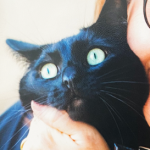
Rook, a black kitten, had a raised bump appear near his eye. It was diagnosed as a mast cell tumor — extremely rare in kittens. The tumor was removed with surgery, but within months, many more appeared. In all, Rook had four surgeries and eight tumors removed. He is doing fine now, and his pet parents were reimbursed $27,285.
10. Ear infections (otitis externa)
Average cost estimate: $100-$175 for simple cases
4.8% of top ten claims for cats
Outer ear infections can be painful and annoying, but if they persist to the middle or inner ear, they can lead to neurological damage and deafness. Recurrent bacterial or fungal ear infections often have underlying causes, such as allergies, yeast, bacteria, abnormal ear anatomy, or ear canal tumors. Chronic ear infections can lead to a painful “aural hematoma”, when blood vessels in the ear flap burst causing it to fill with bloody fluid.
Symptoms may include:
- Head shaking
- Scratching at the ear
- Offensive odor in the ear
- Redness or scabbing inside the ear
- Ear is hot to the touch
- Ear is painful/sensitive
- Excess wax, buildup, or crusting in the ear
Common treatments/diagnostics the Healthy Paws plan insures for ear infections include:
- Diagnostics tools:
- Ear culture and sensitivity test
- CT scans
- Ear cytology
- Ear cleaning to flush out debris
- Antibiotics
- Anti-inflammatories
- Antifungal treatments
- Pain medication
- Surgery (required for some conditions and end-stage chronic ear inflammation)
37% of Americans don’t have $400 in savings†
Lending Tree
It’s heart-breaking to imagine turning down crucial treatment for your pet due to finances.
Claims of fame
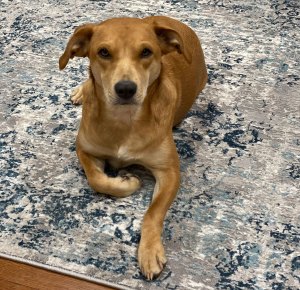
Harper, Labrador mix, two years old
Total claims: $48,780
Healthy Paws reimbursed: $43,713
Coverage: $250 deductible with 80 percent reimbursement level insurance coverage.
In January 2023, Harper was showing signs of pneumonia and an upset stomach, so her pet parent took her to the vet where a radiograph showed severe pleural effusion or fluid build-up in and around the lungs. Initial treatment included a procedure to remove the fluid, a feeding tube, a plasma transfusion, oxygen support, antibiotics and other medications. During her hospitalization, Harper had a seizure and was given anticonvulsants. A CT scan revealed the lungs were inflamed and were leaking air in a section that contained dead tissue. The vets determined she needed surgery to have a lobe of her lung removed. After nearly two weeks, she was released from the hospital and recovered at home with antibiotics and other medications.
Now, over a year later, Harper is doing “amazing” with no health problems, said Jackie, her pet parent. “It was definitely a rough few weeks, and yes, we are so thankful for Healthy Paws!” she said. “Healthy Paws helped us so much that we could keep fighting for Harper.”

Innes, British shorthair, four years old
Total claims: $29,282
Healthy Paws reimbursed: $23,060
Coverage: Reimbursement based on covered treatments using an 80 percent reimbursement level and a $250 annual deductible.
Innes, a cat, had a rough year, developing several conditions that required expensive vet care. When he went in for treatment for a urinary obstruction, the vets discovered he had a hip luxation (dislocation) that required surgery. The urinary obstruction required several days of hospitalization, a procedure to widen the urethra, intravenous fluids, a catheter, and medication, totaling $12,065. The hip luxation required a femoral head ostectomy, a surgery to remove the ball and top of the hip bone, totaling $15,478. Just as he was recovering from those treatments, Innes developed a case of gastritis that required care. Now, more than a year later, Innes is healthy and playful, and only requires prescription food.
Sha, his pet parent, thought they would lose Innes with these serious health issues, but when they were told there was hope of a recovery, she didn’t want to give up.
“The vets told us what was urgent and necessary, so we got to make the decision on time. It was not easy. And of course, we do really appreciate the help from Healthy Paws during this whole process!,” she said.
Luckily, more people are choosing pet insurance – the number of pets insured across North America increased 20.9% from 2022-23.†
North American Pet Health Insurance Association. (NAPHIA)
How does pet insurance work?
Pet insurance is for those unexpected accidents and illnesses you just can’t plan for — like when the dog eats something he shouldn’t or if the cat is diagnosed with diabetes. It works differently than human healthcare plans as it is reimbursement-based, so you don’t have to worry about a provider being “in-network” and can simply use any licensed vet (even emergency and specialty hospitals). With the Healthy Paws plan, you can give your pet the necessary care and may be reimbursed up to 90 percent of your covered vet bills. There are substantial differences between pet insurance policies which can affect coverage and claim reimbursement. The Healthy Paws plan covers new accidents, injuries and illnesses with no caps on claim payouts, and includes breed-specific, congenital, and chronic conditions. Customers benefit from this easy-to-understand policy and our personalized customer support. By getting health coverage for your furry family member, you can be there for them when they need you the most. After all, they’re always there for you.
How to get reimbursed for a covered claim



Key takeaways
We’ve talked to many pet parents, and many say they wished they’d signed up for pet insurance before their pet got sick or injured. They simply didn’t know how expensive vet bills could be and weren’t prepared financially. It’s heart-breaking to imagine turning down crucial treatment for your pet due to financial constraints. Here at Healthy Paws, we strongly believe that pets are family – in fact, we’re not alone! 85% of dog owners and 76 percent of cat owners believe this – and that you try your best to look after your family. Pets bring you joy, love, and good health, and you can return the favor by making pet health care a priority. More people are turning to pet insurance, with the growth rate in North America pet insurance enrollments increased 20.9 percent from 2022-23. This allows pet parents to say “yes” to important vet care knowing they have insurance that can help them.
† Sources: The American Pet Products Association (APPA), Lending Tree, North American Pet Health Insurance Association. (NAPHIA), the Federal Reserve and Phys.org.
*Based on Healthy Paws Pet Insurance claims data between January 1, 2023 – December 31, 2023
**Estimated costs from CareCredit, myaccessvetcare, Preventive Vet, Daily Paws, Great Pet Care, and Healthy Paws claims data.
The content is not intended to be a substitute for professional medical advice, diagnosis, or treatment. Always seek the advice of your veterinarian or other qualified health provider with any questions you may have regarding a medical diagnosis, condition, or treatment options.
For full coverage details and exclusions, see a sample policy.
The claim scenarios described here are intended to show the types of situations that may result in claims. These scenarios should not be compared to any other claim. Whether or to what extent a particular loss is covered depends on the facts and circumstances of the loss, the terms and conditions of the policy as issued and applicable law. Facts may have been changed to protect privacy of the parties involved.
Insureds providing testimonials in this report have not received compensation for their statements.
Plan coverage varies based on the age of the pet at enrollment and the deductible and reimbursement levels chosen at enrollment. Exclusions and restrictions apply. All descriptions or highlights of the insurance being provided are for general information purposes only, do not address state-specific notice or other requirements and do not amend, alter or modify the actual terms or conditions of an insurance policy. Please refer to the terms and conditions of the policy, which set forth the scope of insurance being provided and address relevant state requirements.
Insurance offered by Healthy Paws Pet Insurance is provided by ACE American Insurance Company, Westchester Fire Insurance Company, Indemnity Insurance Company of North America, ACE Property and Casualty Insurance Company and Atlantic Employers Insurance Company and one or more of their U.S.-based Chubb underwriting company affiliates. Chubb is the marketing name used to refer to subsidiaries of Chubb Limited providing insurance and related services. For a list of these subsidiaries, please visit our website at www.chubb.com. This communication contains product summaries only. Coverage is subject to the language of the policies as actually issued. Surplus lines insurance sold only through licensed surplus lines producers. Chubb, 202 Hall’s Mill Road, Whitehouse Station, NJ 08889-1600.
Healthy Paws Pet Insurance & Foundation is the brand name for the program operations of Healthy Paws Pet Insurance, LLC. Healthy Paws Pet Insurance, LLC is a licensed producer in all states (TX license # 1636108); operating in California as Healthy Paws Pet Insurance Services, LLC (CA license #0H16053), and in New York as Healthy Paws Pet Insurance Agency, LLC.
© 2024 Healthy Paws Pet Insurance, LLC. All Rights Reserved.
